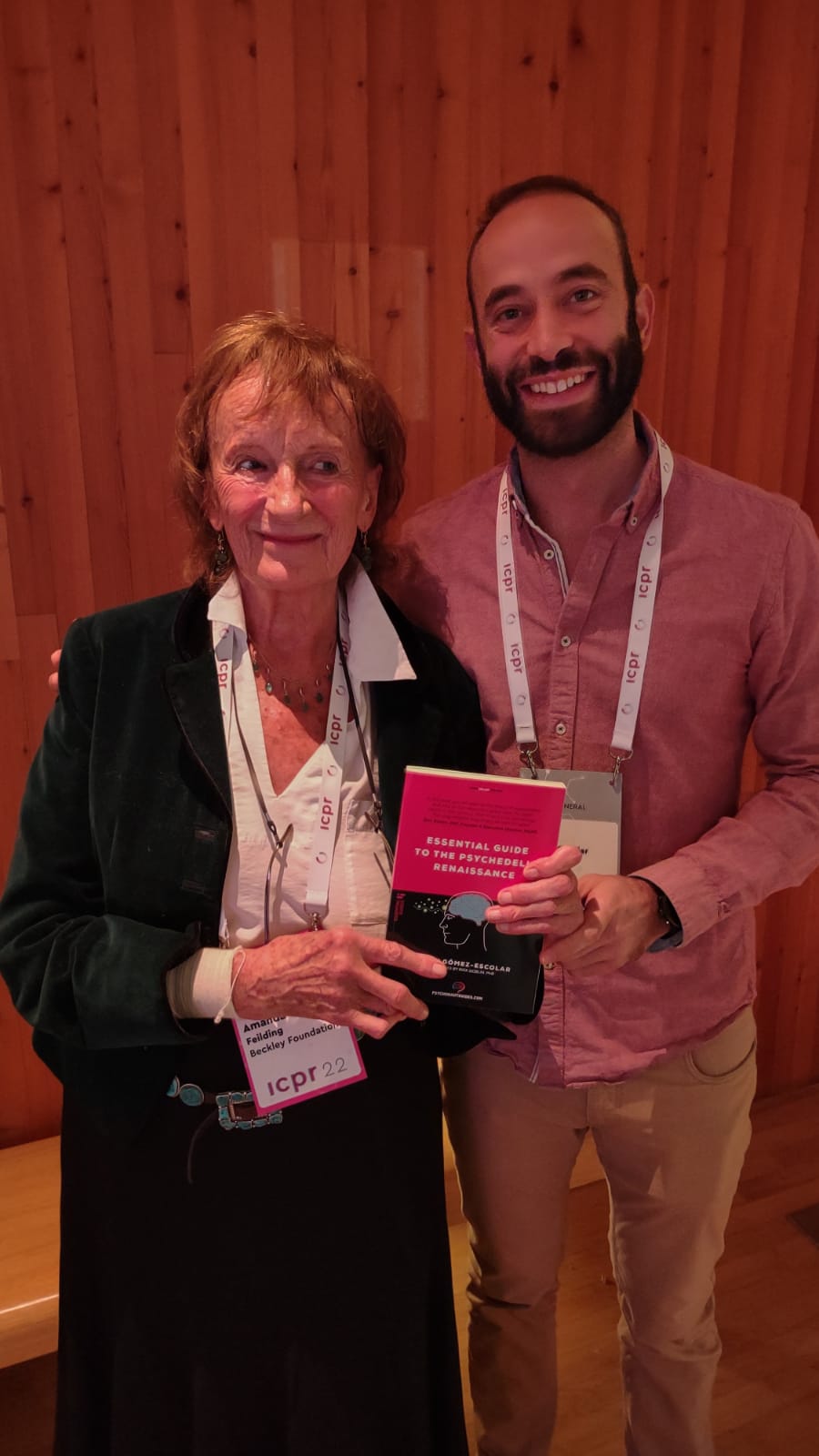By Gabriel García September 29, 2022
With this article we open a section in the page, “Meet:“. This section aims to divulge about some of the most important figures within the scientific advancement and the so-called psychedelic renaissance. For this purpose, we have chosen as our first personality to highlight Amand Feilding.
Amanda Feilding, often called the “hidden hand” behind the renaissance of psychedelic science, is an English drug policy reformer and research coordinator. Her contribution to global drug policy reform has also been seminal and widely recognized.
Amanda first encountered LSD in the mid-1960s, at the height of the first wave of scientific research on psychedelics. Inspired by her experiences, she began to study the mechanisms underlying the effects of psychedelics and set out to explore ways to harness their potential to cure disease and improve well-being.
In 1996, Amanda established the Foundation for the Advancement of Consciousness, which was renamed the Beckley Foundation in 1998. Through the Foundation, she set out to use state-of-the-art brain imaging technologies to examine the neurophysiological changes that underlie altered states of consciousness.
Its goal is to deepen our understanding of consciousness and how changes in cerebral circulation and neural activity underlie the effects of various psychoactive substances, so that we can better harness their potential to improve the human condition.
 “The best way to overcome the taboo, and reintegrate psychedelia into the social fabric, is to conduct the best scientific research.” - Amanda Feilding
“The best way to overcome the taboo, and reintegrate psychedelia into the social fabric, is to conduct the best scientific research.” - Amanda Feilding
After watching with dismay as the “War on Drugs” unfolded, of which we have an article now available, Amanda brought together a network of leading international scientists, politicians and drug policy analysts, being one of the first people to create a scientific evidence base to help reform global drug policies to better protect health, reduce harm and economic costs, and uphold human rights.
Beginning in 1998, he initiated and organized a series of eleven international seminars in the House of Lords, debating key policy issues and drawing attention to the neglected issues of cannabis and psychedelics. These seminars, and the reports derived from them, were highly influential in changing the attitudes of thinkers and policy makers around the world. Through the Beckley Foundation’s Policy Program, Amanda has commissioned and published more than 40 books, reports and policy papers that have analyzed the negative consequences of criminalizing drug use, and laid out possible alternatives that could protect public health, decrease violence and government costs, and protect human rights. Over the years, his advice has been sought by presidents and governments, and in 2011 he wrote the influential public letter calling for drug policy reform, which was signed by presidents, Nobel laureates and others.
Through her leadership of the Beckley Foundation Science Program, Amanda has initiated much groundbreaking research and has co-authored more than 50 scientific articles published in peer-reviewed journals. She collaborates with leading scientists and institutions around the world to design and lead a wide range of scientific research projects (including clinical trials) investigating the effects of psychoactive substances on brain function, subjective experience and clinical symptoms, focusing on cannabis, psychedelics (LSD, psilocybin, ayahuasca, DMT, 5-MEO-DMT) and MDMA. This pioneering research has not only shed light on the mechanisms of action and therapeutic potential of these substances, but also on consciousness itself. This has sparked a groundswell of interest and recognition of the potential benefits that careful use of these extraordinary compounds can bring. The research Amanda has initiated has shown that psychedelics hold great promise for helping people with conditions such as treatment-resistant depression and addiction.

It is through his impressive career that this surge of interest has contributed to the psychedelic renaissance that Anton essential-of-psychedelic-renaissance_978-84-18943-18-8). If you are interested in what to know more about this current cieGómez-Escolar describes in the Essential Guide to the Psychedelic Renaissance. If you are interested in what to know more about this scientific current, the book describes the phenomenon in its entirety: from the basic concepts about psychoactive substances, the history, the effects on the brain, the lines of clinical research and therapeutic potential, the different types of psychedelics, safety measures in their use, among others. It is, in fact, one of the most up-to-date written sources on the legislative status of psychedelics for which Amanda Feilding has fought so hard. The appendix on legality, written by Francisco Azorín (a lawyer specializing in drugs and psychedelics), clearly answers the most relevant doubts about the current legislation and raises questions about its future.
If you are interested in learning how these substances can help improve your mental health, you can read more information about psychedelics in the Essential Guide to the Psychedelic Renaissance,as well. We also recommend Psychedelics and Mental Health, by Irene de Caso and Your Brain on Psychedelics, by Genís Oña, where you will learn the keys to the effects of psychedelics, capable of producing significant changes in the processes of perception, thought and consciousness. The book also includes a prologue written by one of the greatest eminences in this field, José Carlos Bouso, scientific director of ICEERS.

These books are now available on Amazon in physical and eBook format, as well as Apple Books. In addition, all titles are available in Spanish version on GuiasdelPsiconauta.com




